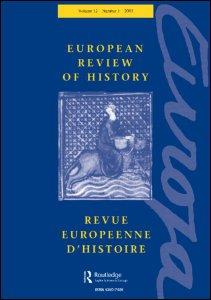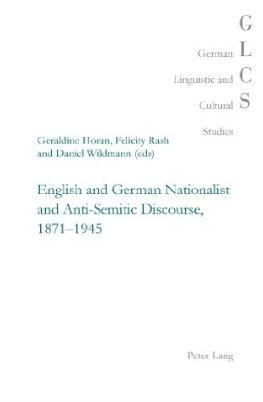Work
 Books worth (re)reading
Books worth (re)readingReview essay, published in the International Journal of Play 5 (3), 2016 (special issue on Histories of Play, edited by Kate Darian-Smith and Simon Sleight), pp. 343-345.Featuring George Eisen's Children and Play in the Holocaust: Games Among the Shadows (1988); Nicholas Stargardt's Witnesses of War: Children’s Lives under the Nazis (2006); Heidi Rosenbaum's “Und trotzdem war’s ’ne schöne Zeit”: Kinderalltag im Nationalsozialismus (2014), and Bastian Fleermann and Benedikt Mauer (eds) Kriegskinder: Kriegskindheiten in Düsseldorf 1939–1945 (2015).Read more...
Presented at the Classical Reception Discussion Group Colloquium on German Philhellenism, University of Cambridge, 15 December 2012.Read more...
 Sparta's German Children: The ideal of ancient Sparta in the Royal Prussian Cadet-Corps, 1818-1920, and in National Socialist elite schools (the Napolas), 1933-1945Buy this item
Sparta's German Children: The ideal of ancient Sparta in the Royal Prussian Cadet-Corps, 1818-1920, and in National Socialist elite schools (the Napolas), 1933-1945Buy this itemSwansea (Classical Press of Wales), 2013.
From the eighteenth century until 1945, German children were taught to model themselves on the young of an Ancient Greek city-state: Sparta. From older children, from teachers in the classroom, and from higher authority first in Prussia, then in Imperial and National Socialist Germany, came images of Sparta designed to inculcate ideals of endurance, discipline and of military self-sacrifice. In treating the final period of this process, the author has collected testimony from numerous surviving German witnesses who attended the Napolas as children in the early 1940s. Read more...
 Brill's Companion to the Classics, Fascist Italy and Nazi GermanyBuy this item
Brill's Companion to the Classics, Fascist Italy and Nazi GermanyBuy this itemedited by Helen Roche and Kyriakos Demetriou; Leiden (Brill), 2018.
Intended for a wide readership, this volume offers the first ever comprehensive guide to the manifold uses and reinterpretations of the classical tradition in Mussolini’s Italy and Hitler’s Germany. The essays within the collection explore the ways in which the classical past was constantly recreated to fit Nazi and Fascist ideology. Political propaganda manipulated the legacy of ancient Greece and Rome in order to create consensus and historical legitimation for the Fascist and National Socialist dictatorships.Read more...
 Fascist and National Socialist Antiquities and Materialities from the Interwar Era to the Present Day: Fascism Volume 8, Issue 2
Fascist and National Socialist Antiquities and Materialities from the Interwar Era to the Present Day: Fascism Volume 8, Issue 2Guest-edited special issue of Fascism: Journal of Comparative Fascist Studies, December 2019.
Fascist Italy and Nazi Germany, along with other twentieth-century authoritarian regimes, have often attempted to create consensus through propagandistic reinterpretations of the classical past. Once Fascism and Nazism had fallen, the material legacies of both regimes then became the object of destruction, reinterpretation and memory work. This special issue stems from an interdisciplinary workshop held in 2018.Read more...
 German Philhellenism: PEGS Volume 82, Issue 3
German Philhellenism: PEGS Volume 82, Issue 3Guest-edited Special Issue of Publications of the English Goethe Society, October 2013.
Inspired by the proceedings of a colloquium on ‘German Philhellenism’ held at Cambridge University in 2012, this volume includes: 'Visions of Philhellenism in the Poetry of Wilhelm von Humboldt: Between historical analysis and idealized modernity' (Felix Saure); '"Life in the Whole": Goethe and English Aestheticism' (Stefano-Maria Evangelista), and '"Anti-Enlightenment": National Socialist educators’ troubled relationship with humanism and the philhellenist tradition' (Helen Roche).Read more...
Presented at the Legacy of Greek Political Thought Network Workshop, University of Bristol, 8 December 2012.Read more...
 '"Wanderer, kommst du nach Pforta…": The tension between Classical tradition and the demands of a Nazi elite-school education at Schulpforta and Ilfeld, 1934–1945'
'"Wanderer, kommst du nach Pforta…": The tension between Classical tradition and the demands of a Nazi elite-school education at Schulpforta and Ilfeld, 1934–1945'in European Review of History / revue européenne d'histoire 20 (4), 2013, pp. 581-609.
This article explores the tensions which arose when Schulpforta, Germany’s most renowned humanistic boarding-school, was forcibly turned into a Nazi elite-school (a Nationalpolitische Erziehungsanstalt, or Napola). The time-honoured traditions of Christianity and enlightened humanism previously cultivated at the erstwhile Landesschule zur Pforta (alma mater of Fichte, Ranke and Nietzsche) were swiftly subordinated to the demands of national-socialist ideology.Read more...
 ‘"Anti-Enlightenment": National Socialist Educators' Troubled Relationship with Humanism and the Philhellenist Tradition'
‘"Anti-Enlightenment": National Socialist Educators' Troubled Relationship with Humanism and the Philhellenist Tradition'in Publications of the English Goethe Society 82 (3), 2013, pp. 193-207.
This article examines some of the ways in which scholars and educators under National Socialism attempted to construct a model of philhellenism for the ‘Thousand Year Reich’ which explicitly defined itself as descended from, yet opposed to, earlier manifestations of the phenomenon, especially as personified by Enlightenment figures such as Winckelmann and Goethe. They also proclaimed a return to the true, ‘living’ spirit of the original Greek gymnasion.Read more...
 "'In Sparta fühlte ich mich wie in einer deutschen Stadt" (Goebbels): The Leaders of the Third Reich and the Spartan Nationalist Paradigm'
"'In Sparta fühlte ich mich wie in einer deutschen Stadt" (Goebbels): The Leaders of the Third Reich and the Spartan Nationalist Paradigm'in English and German Nationalist and Antisemitic Discourse, 1871-1945, ed. Felicity Rash, Geraldine Horan, Daniel Wildmann, Oxford (Peter Lang) 2013, pp. 91-115.
This article examines some of the ways in which many of the Third Reich's leading figures (including Hitler, Goering, Goebbels, Rust and Rosenberg) treated Sparta as the perfect paradigm of a racially-pure warrior-state, as well as claiming that, in a certain sense, the Reich was Sparta incarnate.Read more...
